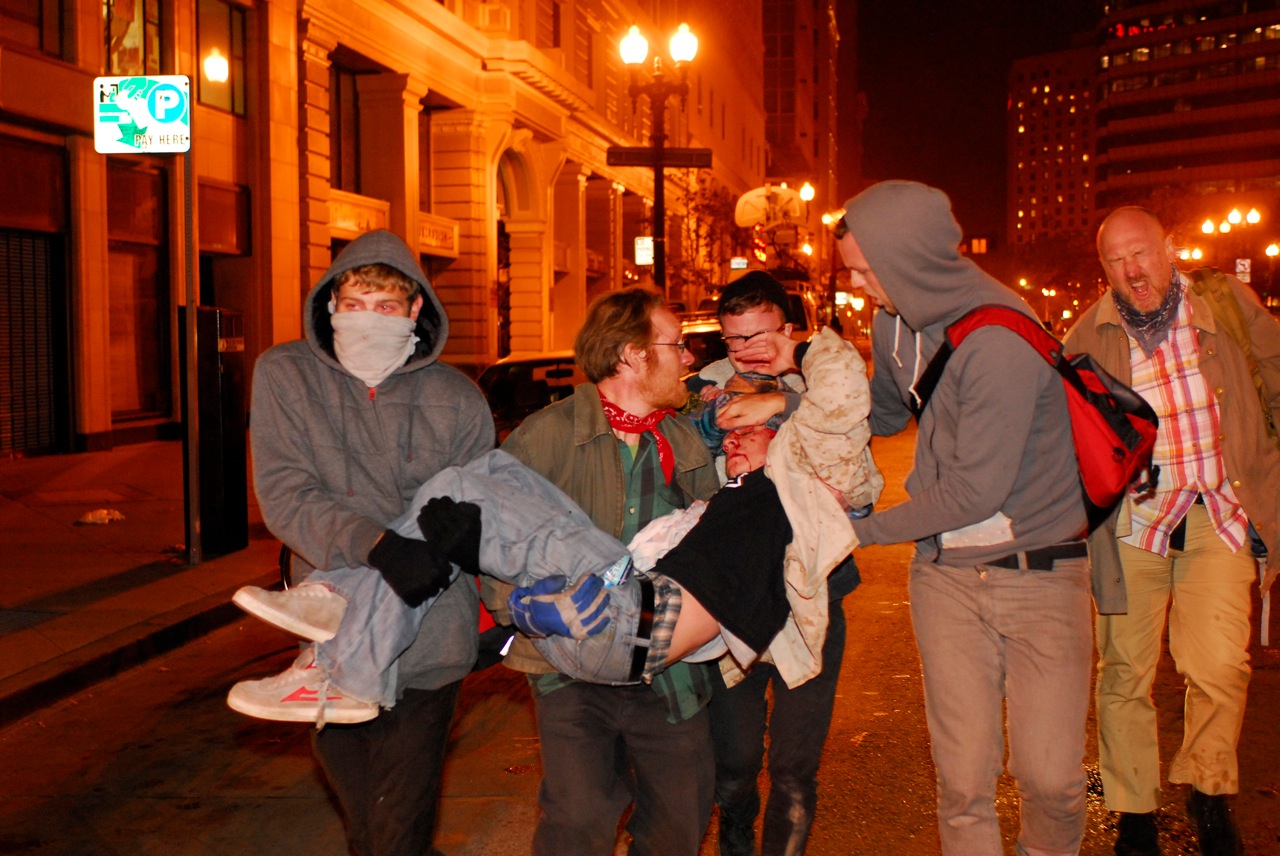American Leftist has great coverage of the daily developments in the West Coast.
The Nation published Norm Stamper, chief of the Seattle Police Department during the WTO protests in 1999. Stamper describes the police decision that started the Seattle events as a mistake, and laments the growing militarization of US police forces around the US. His most important paragraph however is one about the link between the brutality of the police and the hierarchical organization itself.
Perhaps introducing Occupy Wall Street consensus based General Assembly model to the police would be a good thing, though I am afraid that this will probably have to wait for after the revolution. As it were, I'd disagree with Stamper here, as the problem of police brutality is has much to do with the "professional" corporate mindset that the police both embodies and serves as it is to "juvenile delinquency" of police officers. Professional culture only provides a simulacrum of personal liberty while hiding the hierarchies beneath motivational speaking jargon. As long as the police work for the 1%, it will be brutal when the 1% feel threatened. But one could agree with Stamper that the brutality of certain police officers is inculcated through the dehumanizing process to which which the lower ranks of the police are themselves subjected.The paramilitary bureaucracy and the culture it engenders—a black-and-white world in which police unions serve above all to protect the brotherhood—is worse today than it was in the 1990s. Such agencies inevitably view protesters as the enemy. And young people, poor people and people of color will forever experience the institution as an abusive, militaristic force—not just during demonstrations but every day, in neighborhoods across the country.
Much of the problem is rooted in a rigid command-and-control hierarchy based on the military model. American police forces are beholden to archaic internal systems of authority whose rules emphasize bureaucratic regulations over conduct on the streets. An officer’s hair length, the shine on his shoes and the condition of his car are more important than whether he treats a burglary victim or a sex worker with dignity and respect. In the interest of “discipline,” too many police bosses treat their frontline officers as dependent children, which helps explain why many of them behave more like juvenile delinquents than mature, competent professionals. It also helps to explain why persistent, patterned misconduct, including racism, sexism, homophobia, brutality, perjury and corruption, do not go away, no matter how many blue-ribbon panels are commissioned or how much training is provided. (The Nation)
Some UC Davis academics have risen to the occasion, and not in the typical way of trying to contain and tame student anger, but in genuine solidarity. Bob Ostertag describes the concrete changes in police strategy that we are witnessing. Nathan Brown, Assistant professor in the English department, wrote a sharp open letter calling for a resignation of the UC Davis Chancellor, Linda P.B. Katehi.
Of course, the militarization of the police is equal parts a reflection of the ruling class preparing for over a decade to exactly what is happening today, and a business, indeed one of the few sectors of capital that is not just doing fine but booming today. In Egypt, the Tahrir Intifada entered a new phase:
The tear gas used against the Egyptian people, as reported by the Hossam el-Hamalawy, and Patrick Connors, is manufactured by CSI, which bills itself as "a leading manufacturer and marketer of tactical munitions, pyrotechnics, less-lethal crowd control and launching systems sold under the CTS and Penn Arms brands." CSI is a venture capital project owned partly by Point Lookout Capital, whose two partners are no doubt making a killing, quite literally, in the death business, including the "less lethal" franchise of CSI. It is perhaps worth pondering the uncommon honesty of CSI, whose products for "law enforcement" are marketed as "less-lethal" rather than non-lethal. As usual with violence, there is an Israeli connection. CSI sells the gas canisters that Israeli soldiers use, not only to attack protesters, but also to kill them. The pepper spray used in UC Davis is manufactured by another company, whose name will be revealed in due course. But the differences between companies is not as important as the unity of the class of people who own all of them.

Update from Nedster: Egyptian thugs show the world how it's done:
















